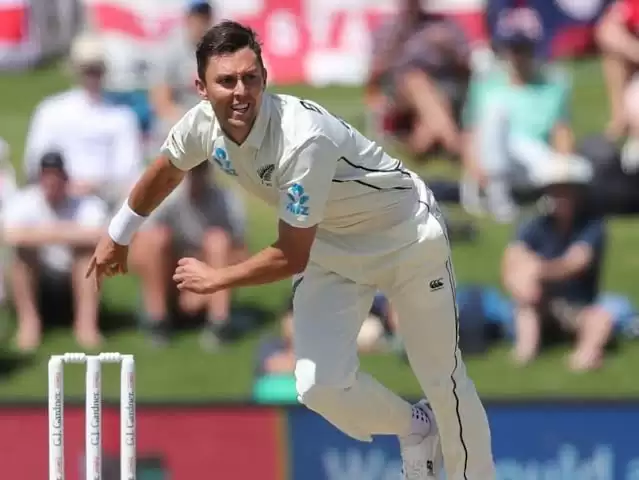
Trent Boult opted for semi-retirement from playing for New Zealand by withdrawing from his central contract.

At the age of 33, having gone through the delivery stride 23,527 legal times at the international stage, one could understand why Trent Boult would’ve begun contemplating his future.
Approaching the twilight of his successful career, where he might no longer be able to retain his currently rich fitness standards, Boult has sought a release from NZC’s central contract list to “spend more time with his family, while also making himself available for domestic leagues.”
From the end of the tour of the Caribbean later this month, the left-arm swing master will be a sporadic presence for the Black Caps, available for selection only when his family and league commitments allow him to.
It’s a win-win for him from a personal standpoint. As a fast bowler, he has reached a stage where he no longer desires to stay on road all year long when there are avenues available to maximise his pay-cheques in minimal windows and cater to a young family.
Trent Boult’s win-win deal, however, points to a direction of travel of the international game and is another big dent to its future, with best players from countries outside self-sustained Big 3 opting to retire early and earning their livelihood in T20 leagues that continue to prosper.
Not even the prestige attached to the two looming World Cups could dissuade Boult from going down this path. He may still appear in Australia and India, but the pacer doesn’t want the journey towards the two marquee ICC events to take most of his calendar. He can spend those months filling his bank coffers with the financial moolah of an IPL and sign with leagues set to mushroom in UAE, South Africa and the USA, with IPL’s billion-dollar corporate giants involved.
Play two leagues with hefty contracts and give your family their due for the rest of the year is the path the great AB de Villiers, too, chose for himself at a similar age until his returns declined and the selfless character opted to retire completely.
While there were precedence in the Caribbean due to maladministration, when De Villiers took his call, it was still the beginning of top-brass players putting T20 leagues at the centre of their attention and retiring early. Boult’s move is indicative of international cricket reaching a mid-life existential crisis and staring at its dooms day from a distance.
For us, who hold the international game on a pedestal still, there is always an unavoidable sense of frustration and anger towards the player involved in opting for early retirement to maximise his pay in domestic leagues. Keep in mind, though, these are professional athletes with young families on board, looking to maximise their earnings in the limited time span they have at their peaks.
When people from different walks of life are entering their best years in respective fields, these players tend to approach their sunset, with the rigours and the grind of the sport bringing about wear and tear to their games and eulogies of their end getting sung loudly.
Players no longer need international cricket to sustain their livelihoods. No longer can sports administrators dictate terms to them. They rule the roost now, hold the cards to the direction they want to take for themselves and consequently, the sport as a whole.
The proliferation of leagues all over the globe has given players unprecedented power. You can’t bind them to NOCs, they can choose not to sign contracts that require them. Trent Boult just walked out of one.
Going forward, IPL‘s major finance players may look to bring in place year-long contracts of their own, which will allow them to field the world’s best players in different leagues they own a stake with. That may prove to be the final nail in the coffin for international cricket.
All this, again, can’t be a reason to crucify the players, for the unavoidable truth for the international game is that it stands at the mercy of its top full-member boards. They are compelled by billion-dollar broadcasting deals to prioritise their respective leagues over sustaining the three formats at the highest level. Players are merely gaining strength out of their standing and dipping in to fetch their small but critical share of the financial pot. We can’t fault them for that.
If at all there is greed, it is in the administrators’ minds as they continue to sell the international game short by excessively crowding the calendar with a match seemingly every alternate day of the week.
Yes, the backlogging of fixtures after the pandemic break hasn’t helped. But when the game needed to accept the moment of truth and tide through the phase with caution and patience, administrators scheduled matches in the smallest possible windows and left the players with no choice but to free up their calendar and fans with zero appetite for international cricket, which is losing its primacy by every passing day.
In the coming weeks, months and years, don’t be surprised to see more Trent Boults putting a formal or informal end to their careers for less stress and better livelihood elsewhere, with the international game reduced to a freelance sport, left to face its moment of reckoning.
The dreaded future is here. We can’t change it.
Related Topics:
NZC agree to release Trent Boult from central contract; pacer opts for semi-retirement
Watch: Trent Boult gifts fanboy his shirt; fan hilariously offers his shirt in return